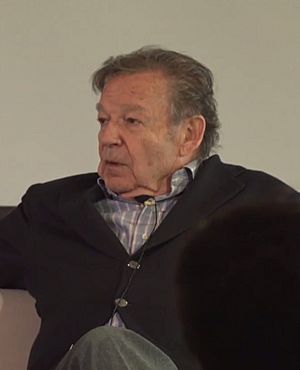Luis Racionero facts for kids
Luis Racionero i Grau (born January 15, 1940 – died March 8, 2020) was a Spanish writer known for his essays. He wrote about many interesting topics like philosophy, art, and history.
He was born in a town called la Seu d'Urgell in Lleida, Spain. He studied engineering and economics at the University of Barcelona. Later, he traveled to the United States to study urban planning at the University of California, Berkeley.
Luis Racionero held important positions during his career. He was the director of Spain's national library, which is a very important place for books and knowledge. He also directed the Spanish College (Colegio de España) in Paris, France. He wrote for well-known newspapers like El País and La Vanguardia. He wrote his books and articles in both Catalan and Spanish.
In 1999, he won a special award called the Fernando Lara Novel Award. He won it for a book he hadn't even published yet, called La sonrisa de la Gioconda (which means Mona Lisa's smile).
Books and Ideas
Luis Racionero wrote many books throughout his life. His works explored a wide range of subjects, from ancient history to modern ideas. He often wrote about the differences and similarities between Eastern and Western cultures. He also explored how people live and find happiness.
Here are some of his books:
- Filosofías del underground (Philosophies of the underground), 1977
- Sistemas de ciudades y ordenación del territorio (Systems of cities and planning), 1978
- Leonardo da Vinci, 1978
- Cercamón, 1981
- Del paro al ocio (From unemployment to leisure), 1983
- Textos de estética taoísta (Texts of Taoist aesthetics), 1983
- El Mediterráneo y los bárbaros del Norte (The Mediterranean and the barbarians of the North), 1985 and 1996
- La forja de l'exili (The forging of the Exiles), 1985
- Los ángeles cuánticos (Quantum Angels), 1986
- Arte y ciencia (Art and Science), 1988
- El Arte de Vivir (The Art of Living), 1989
- Florencia de los Médicis (Florence of the Medicis), 1990
- Atenas de Pericles (Athens of Pericles), 1993
- Oriente y Occidente: Filosofía oriental y dilemas occidentales (East and West: Eastern Philosophy and Western dilemmas), 1993
- El arte de escribir (The art of writing), 1995
- La cárcel del amor (Prison of Love), 1996
- El genio del lugar (The genius of the place), 1997
- Guía Práctica para Insatisfechos: Valores, Política y Futuro (Practical Guide to Values, Politics and the Future), 1997
- El progreso decadente (Decadent Progress), 2000 (This book won the Premio Espasa de Ensayo prize)
- El pecado original (Original Sin), 2001
- La Costa Brava recuperada (Costa Brava recovered), 2000
- El alquimista trovador: una fascinante novela histórica sobre Rai Mundo Lulio (Trovador the alchemist: a fascinating historical novel about World Lulio Rai), 2003
- La sonrisa de la Gioconda (Mona Lisa's smile), 2004
- Conversaciones con Pla y Dalí (Conversations with Pla and Dalí), 2004
- El libro de los pequeños placeres (The Book of Small Pleasures), 2005
- Los complejos de la derecha (The complex on the right), 2006
- Leonardo Da Vinci: genio del Renacimiento (Leonardo Da Vinci: genius of the Renaissance), 2006
- Sobrevivir a un gran amor seis veces -Memorias- (Surviving a great love six times -Memoirs-), 2009
See also
 In Spanish: Luis Racionero para niños
In Spanish: Luis Racionero para niños


